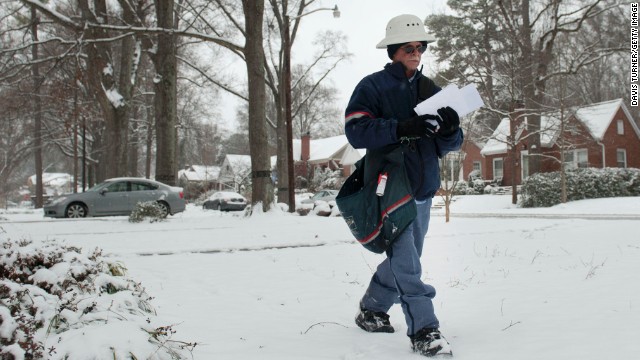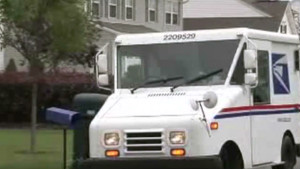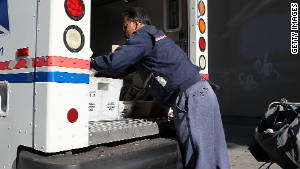- Back to Home »
- Greene: Goodbye, mail carrier

- Bob Greene: Postal service may kill door-to-door service, switch to 'cluster boxes'
- He says it's an unpopular idea, but postal service must find ways to save money
- He says if a personalized service like mail delivery were proposed today, it wouldn't fly
- Greene: Cluster boxes almost inevitable; postal service is in an unenviable position
Editor's note: CNN Contributor Bob Greene is a bestselling author whose 25 books include "Late Edition: A Love Story"; "When We Get to Surf City: A Journey Through America in Pursuit of Rock and Roll, Friendship, and Dreams"; and "Once Upon a Town: The Miracle of the North Platte Canteen."
(CNN) -- Cluster boxes.
If you haven't heard of them yet, you will soon.
They are about to change something basic about American life: the sight of the mail carrier strolling up to the front door to drop off that day's letters, magazines, bills and advertising fliers.
Door-to-door mail delivery appears to be a luxury that the U.S. Postal Service no longer can afford. It's no secret that the Postal Service is in terrible financial trouble; last year the agency lost $16 billion. No business can afford to go on that way without making dramatic changes.
As CNNMoney's Jennifer Liberto reported from Washington last week, the Postal Service has begun telling communities with new housing developments that mail carriers will not provide doorstep, or even curbside, delivery.
Instead, cluster boxes -- groupings of mailboxes at a centralized point in the community -- will be constructed. Homeowners will be expected to leave their houses and go to the nearest cluster box to pick up their daily mail.

And in Congress, Rep. Darrell Issa, R-California, is proposing that door-to-door delivery be done away with not just in new developments, but at existing homes, too. He believes the Postal Service could save $4 billion a year this way.
It's hard to counter the argument that if something drastic isn't done, the Postal Service simply won't be able to operate much longer. With Americans relying more and more on e-mail and text messages, and with bills being routinely paid online, the Postal Service isn't bringing in enough revenue to justify the enormous costs of universal mail delivery.
Postmaster General Patrick Donahoe has been pushing for the elimination of Saturday mail delivery, but congressional resistance made him put the plan on hold. Even though Donahoe says that Saturday delivery is no longer fiscally feasible, members of Congress are reluctant to anger their constituents -- both individuals and businesses -- by letting the plan go through.
If the cluster boxes begin proliferating, though, and people are told that the mail carrier won't be appearing at their doors, you can expect widespread unhappiness and high-decibel frustration.
It's not that people don't understand that the Postal Service is on the ropes. But to declare such a fundamental American tradition -- the arrival of the postal carrier at the front door -- past tense will not go unnoticed or uncontested.
It's hardly wild speculation to predict that people will not relish having to go out into the weather every time they want to retrieve their mail. Some won't trust the security of the group mailboxes, no matter how many assurances they receive. They'll be especially vexed on rainy or snowy days when they make the trip to the cluster boxes, only to find that the carrier hasn't arrived yet. For those accustomed to door-to-door mail service, the act of picking up and sorting through the mail in front of other people may feel less private.
Yet the really noteworthy thing is not what may be ending -- the noteworthy thing is what we have taken on faith for so long. If someone in government, today, were proposing to start the Postal Service from scratch, offering the amenities Americans are accustomed to, he'd be laughed out of the room.
 Postal Service to end Saturday delivery
Postal Service to end Saturday delivery  Postal Service launches clothing line
Postal Service launches clothing line "You're saying that this service of yours would be expected to send uniformed workers to every house and business in America?"
"Yes."
"How would the homeowners and business owners summon these couriers?"
"They wouldn't have to summon them -- the postal workers would be required to just automatically show up."
"How often?"
"Every day but Sunday."
"And then you say that they'd carry the letter anywhere in the country? Door to door?"
"Yes."
"So how much would it cost to take a letter from, say, St. Louis, Missouri, to Kansas City, Missouri?"
"Forty-six cents."
"But how can you possibly do such a thing so cheaply?"
"Some people will complain that it's too expensive."
"All right -- but if it's 46 cents to take a letter from one town in Missouri to another town in Missouri, how much would it cost to carry a letter from, say, New York to San Francisco?"
"Forty-six cents."
"What?"
"It would cost the same, no matter how great the distance."
"That makes no sense at all. What about the cost of fuel? How can you charge the same amount for a letter to go five miles as you charge for it to go 3,000 miles?"
"Because that's what people will insist on."
It does sound impossible, doesn't it? It sounds like a plan so farfetched that it would never get off the ground.
Yet it has been an unquestioned part of the way we've always lived.
We no longer live that way. We expect our information to reach us instantly, on screens and phones and tablets, wherever we may be.
But we expect to receive our mail the old way, too.
It's an unenviable position for the people who run the Postal Service to be in.
See you at the cluster box.
Follow us on Twitter @CNNOpinion.
Join us on Facebook/CNNOpinion.
The opinions expressed in this commentary are solely those of Bob Greene.







